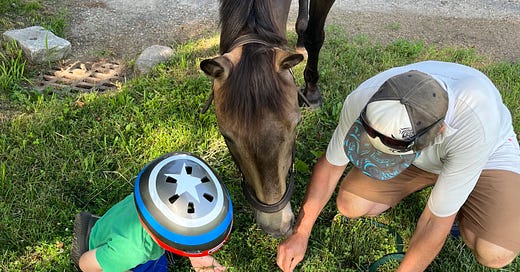It was not part of the plan. After our lesson, Liam usually gives Tully some hay as a treat. On this day, we decided to try an experiment. We led Tully to the grass and put the hay on the grass to find out which he preferred – hay or grass?
Before I share the results, the idea for this experiment emerged through conversation. In Ken Robinson’s TedTalk, he noted schools are designed to kill creativity, not inspire creative thought. Liam feels comfortable asking questions and sharing his thoughts. He is a happy and energetic child who happens to be on the spectrum. He wants to learn.
Isn’t this the drive for learning? Students want to explore, share ideas and learn from others. Why has education become a closed society with no exploration, hoarding information and banning questions?
Tully ate the grass first. But to our surprise he ate the hay and grass, mixing the two together. We did not know Tully enjoyed gourmet dining. He preferred variety. Next, we picked different varieties of grass. He liked both equally. We determined Tully is a healthy eater.
Education is not intended to be scripted. It is a messy process. There is no argument that we all learn differently. Forcing one way of learning has become normalized.
Either you are with us or against us, as the old politician once said. I see this trend everywhere I go now, not just in schools. For me, horses are the equalizers. They don’t have discrepancies. We humans often say one thing and do the opposite. Horses’ communication and actions match. There is no doubting what they tell us.
For a child, especially a child with autism, this is a comforting change in a very confusing world. Children who are autistic are truth tellers. Therapy horses see this and value this truth telling. My job is to facilitate and get out of the way. The relationship between the horse and child is where the learning happens.
On this day, Tully offered a valuable lesson. The grass, we determined, was like going to a farmer’s market. The grass was fresh and full of nutrients. We talked about the difference with produce in a grocery store compared to a farmer’s market.
Tully also appreciated the hay. This was more filling than the grass. But there was also an exchange – Tully appreciated Liam’s gift. Those who know horses will understand that horses will change their behavior with children who are gifted. Tully looks forward to the lessons with Liam. It is something different for him. We offer Tully choices: grass or hay. We include him. We respect his input but make sure he understands our decisions.
Horses have an innate ability to teach us humans about democracy. This is how a herd survives. With therapeutic horse riding, the child learns how to be a leader not a dictator.
Horses might obey a dictator but are less interested in helping you. They are relieved when the dictator leaves. There is no partnership.
Walk with a horse on the ground before jumping on its back. See what they see.
If you are interested in booking a therapeutic horse riding lesson, you may learn more here.





Cam, I love this blog. I love the way you write about Liam and Tully and the grass--I can feel and taste the love you experience. Thank you for sharing your talents! I miss you. Hugs.